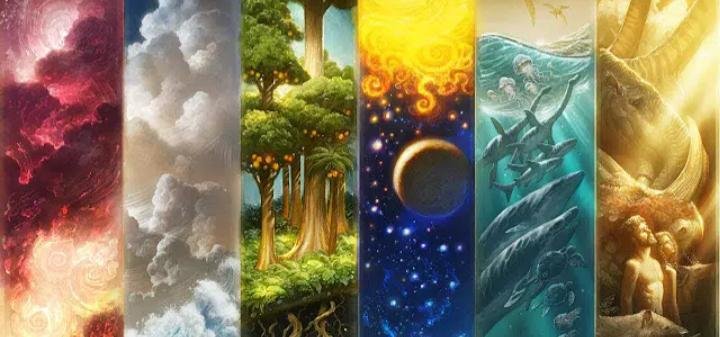Ben Cline
Yeah, that's great. And, you know, there's, so much information, I think, about this topic that's out there. It's hard to kind of boil it down into just a small section, and in the amount of time that we have this morning. But one of the questions that I ran across is, you know, as far as that question, "Is Jesus, God? The question that's out there is, "did Jesus even claim to be God?" When you look through the pages of scripture, I think as Americans, maybe we tend to be this way. That we want things to be so cut and dry. We want him to be, you know, clear. And the words, you know, "I am God," are not in there. When you look through the pages of scripture, however, he did make the claim that he is God. Just because he didn't use those words that we would've expected him to use, doesn't mean that he didn't make that claim to be God. So there is that claim from Jesus. John 10:30 is one of those places it says, "I and the Father are one." And if you look at the context of that passage of scripture, he's speaking in, at least in an arena where the Jews are overhearing, the religious leaders are overhearing this take place. And just by their reaction to him, you know, that he is actually making that claim that he is God. A few verses later, you look at what the Jews said back to him. They're basically saying, "you are blaspheming, because you're claiming to be God." And in verse 33 it says, "you, a mere man, claim to be God." And so Jesus is making that claim that he is God. And then in John 8:58, is another example, "Jesus says, "I tell you the truth, before Abraham was born, I am." And again, he's not saying, "I am God," in the way that us Americans might want him to say, "I am God," but he is saying, "I am God," by just using those two words, I am. And really, what he is referencing is all the way back to the Book of Exodus, is chapter 3:14, where God revealed Himself as the I am. And really, what that means is that He is the self existent one. So there can't be, you know, two self existent ones who don't need to have reliance on anything else. So, you know, Jesus is definitely making that claim that he is God, and then his disciples also make that claim. Jonathan, you mentioned this: as the Apostle John wrote his book, he started off chapter one in that way. You know, even down into verse 14, he says that God came and dwelled among us. You know, these are evidences from the scriptures and from Jesus' followers, that he did make that claim to be God, that He is God. Thomas is another one. We give him the name, Doubting Thomas, because of the way that he, you know, acted in the end toward Christ. But as Jesus came back and revealed himself, you know, as the risen savior to Thomas in John 20:28, Thomas saw that evidence, right? The evidence with the nail prints in his hand and the hole in his side. And he bowed down and worshiped him, and he said, "my Lord and my God." And the interesting thing about that is that Jesus didn't correct him. Jesus didn't tell him, "no, you don't need to call me that." Jesus accepted that worship as God. And so, there's just so much evidence, and this is all biblical evidence, of course, but this is all, you know, evidence that Jesus is God. And then, you know, we talk about the second part of that question. Is he the only way to eternal a life? Well, the provision of salvation itself is evidence that Jesus is God. You know, I might let you get into this, Gary, if that's the direction that you're heading on answering that second question. But, you know, the salvation that we need because we're sinners, the Bible talks about the fact that we are sinners because we miss the target. We miss the mark when it comes to living according to God's law, according to His righteousness. And so we are sinners, and that sin means that we cannot be in God's presence. There's that separation that has been made because, you know, we're not righteous in and of ourselves. We can't be in God's presence. And now we look to what Jesus Christ provided, you know, with his sacrifice on the cross. And you have to understand that it is only God who could make that provision of salvation for this situation that we're in, you know? To fix that relationship that's broken. And so there's some evidences for, you know, why I believe that Jesus is God.
Gary Schick
And I think it's really interesting, you know, we're kind of looking at this as believers looking at the scripture and saying, you know, as Jonathan pointed out, here's Jesus doing the things that God does, and showing those attributes. And, you know, I think it's really interesting in terms of the claim...let's think about where Jesus was. He was in Israel, he was among the people who were monotheists. They believed in one God. They didn't believe in, you know, all the gods of the pantheon, that the gods had come down to earth like the Greeks did. And so Jesus, in order to get that across, would have to reveal it in a certain way. Not only so that it would click, but that it would be believable. And I think for any of our listeners who maybe aren't Christians or are believers but you kind of, you know, "we have questions, we have doubts." I think this is a helpful question to ask. And so as I was kind of looking at it, you know, is Jesus, God? Well, what would we expect if he was God? And number one, I think we've all kind of addressed it, he would in some way claim to be. We do see evidence of this in, really all four gospels. For example, Matthew 11:27, Jesus says, "all things have been handed over to me by my father, and no one knows the son except the Father. And no one knows the Father except the son, and anyone to whom the son chooses to reveal him." So he is identifying with the Father in a very unique relationship that says, "you know what? You can't know the Father. I mean, only I know the Father and whoever I reveal Him." That's quite a God claim there. Or Mark 2:5-7 and in Luke 5:17,26 both tell the same story of how some men brought to him a paralyzed man carried by four of them. They dug a hole through the roof, pretty dramatic, to get through the crowd. Lowered him down through the roof, and before Jesus heals this man it says, "when he saw their faith, he said to the paralytic, 'son, your sins are forgiven.' Now, the scribes who were there immediately saw what that meant. They said in their hearts, 'why does this man speak like that? He is blaspheming! Who can forgive sins, but God alone?" Jesus, first of all, reads their minds. He knows what they're thinking. Well, you might say anybody might know what they're thinking at that point, but he asked this interesting question, "well, which is easier? To forgive sins, or to say, 'rise and walk?" He has just said, "I forgive your sins," a God claim. And then he says, "now, rise and walk," which shows there's something behind that claim. And then, as Ben, as you pointed out, there's so many statements in John's gospel. Again, going back to what you mentioned there, where Jesus said, "I solemnly declare it before Abraham came to be, I am." So two things there: as you pointed out, he's identifying himself with the God of Exodus 3:14, where God replied, "I am who I am." But also he's saying, "and before Abraham was, I am." Well, the Jews are looking at him and saying, "Hey, you're what, 30 years old? How is it that you were alive and well before Abraham?" So they were catching it. Again, you pointed out John 10:30, "I and the Father are one." John 14:9, "whoever has seen me, has seen the Father." And then there's these many clear statements about himself that are basically God's statements. Jesus said, "I am the bread of life," John 6:35. "I am the light of the world," John 8:12. "I am the gate," John 10:9. "I am the good shepherd," John 10:11,14. "I am the resurrection and the life," John 11:25. "I am the way, the truth and the life," John 14:6. And, "I am the vine; the life giving one," John 15:1,5. So, does that prove Jesus was God? Just because, in so many words he said, "I am God," no. But if he's God, we would expect him to be making those claims. And then you kind of ask the questions that C.S. Lewis asked, "well, is he saying this because he's off balance in some way?" Everybody around him saw that Jesus was very sane. And as we read the scriptures, he comes across as very balanced, very sane. Was he some kind of a significant liar, you know? Just kind of a pathological liar? Well, there again, that's not how Jesus comes across. So he is either Lord, lunatic, or a liar. Is he telling the truth or not? But again, we don't have to stay with what he says. There's also the evidence of the miracles. And it's interesting. Even his most arch-enemies, none of them doubt that he does miracles. And so Jesus himself said in John 10:37, 38, "if I am not doing the works of my father, then don't believe me. But if I do them, even though you do not believe me because of the works, so that you may no and understand that the father is in me and I am in the Father." John 14:11, "believe me, that I am in the Father and the Father is in me. Or else believe on account of the works that I do." So Jesus said, "look, if you don't believe my words, look at what I've done." And of course, we can look back now, 2000 years later, and we can compare the two sides of the Bible. You have the Old Testament, where there's many prophecies of the Messiah, and the New Testament where Jesus fulfills them. In fact, as I kind of did a little research into this, conservatively speaking, Jesus fulfilled at least 300 Old Testament prophecies of who the Messiah would be and what he would do. Now, I did a little more research. And what do you expect the odds would be that Jesus would not fulfill 300, but maybe say eight prophecies? He probably said, "well, that probably wouldn't be too hard." Actually, the chances that Jesus would fulfill just 8 Old Testament prophecies is 1 in 10 to the 17th power. So, you wanna know how big a number that is? That is one out of, and then you put a one with 17 zeros after it. I don't even know how you say a number like that! You know, what is that? A gazillion? Or a Google? It's huge! One into something with 17 zeros after it, are the chances of just fulfilling eight. And Jesus fulfilled conservatively, something over 300. And then of course, there is the final detail, the thing that brought Thomas to his knees, saying, "my Lord and my God." The resurrection. You know, the 11 remaining disciples, we know Judas committed suicide after he betrayed Jesus. But the other 11, they all went to their deaths, rather than deny that Jesus---they saw him alive, risen from the dead. In fact, the Apostle Paul tells us that on one occasion, more than 500 people saw him alive. And when Paul was writing that, most of them were still alive, and they could be verified with, they could be talked to. So is Jesus God? He makes the claim. He did the works that showed he was God. He triumphed over death. You know, there have been other great leaders, thinkers, religious people. These people, they were honest enough not to make such a claim. Buddha never claimed to be God. Mohammed never claimed to be God. Buddhists talked about enlightenment. Muhammad talked about being a prophet. Jesus is the only one who says, "and by the way, I am He." And so, you know, we come back to it. Was He the Lord? Was he out of his mind? The least trustworthy of all the religious leaders that have ever existed? Or was He exactly who He was saying He was? He only makes that claim, and he's the only one also who promises us heaven. The others basically said, "well, here's what I think. Here's what I have found. Here's what I'm trying to do." But none of them had been to the other side. Jesus alone says, "I've come from the other side and I've come to bring you to where I am." So some powerful statements and some very powerful evidence that not only can he make such a claim, but that he's done what is necessary to bring us home, friends. After looking at it, I have to be honest. Presented with the facts about Jesus, for me, it takes more faith not to believe that Jesus is the Christ than to believe that he is. And that's pretty powerful stuff. What an awesome savior!



























